Author: 0XNATALIE
In the search for solutions to the scalability and computational efficiency of blockchain, zero-knowledge proof (ZKP) technology is particularly important. zkVM (Zero-Knowledge Virtual Machine) is one specific application of this technology. As a general-purpose computing platform based on ZKP, zkVM can verify the correctness of computations without revealing execution details, and support off-chain processing of large-scale tasks, submitting only the verification results to the blockchain, greatly enhancing the scalability of the blockchain. Currently, multiple projects such as a16z, Taiko, and ZKM are developing zkVM solutions in the market.
Introduction to zkVM
zkVM is a general-purpose computing platform based on zero-knowledge proofs, capable of executing various computing tasks, including smart contract execution, data processing, and complex algorithmic operations. Its core function is to generate zero-knowledge proofs, which can verify the correctness of computations without revealing execution details. Through SNARKs technology, these proofs can be verified off-chain, eliminating the need for validators to re-execute the entire computation process on the blockchain, thus avoiding expensive computational costs.
Furthermore, zkVM's design is not limited to cryptocurrency transactions. Its versatility allows deployment in various application scenarios such as medical data processing, supply chain management, and secret voting systems, all of which require ensuring data security while verifying the correctness of processing logic.
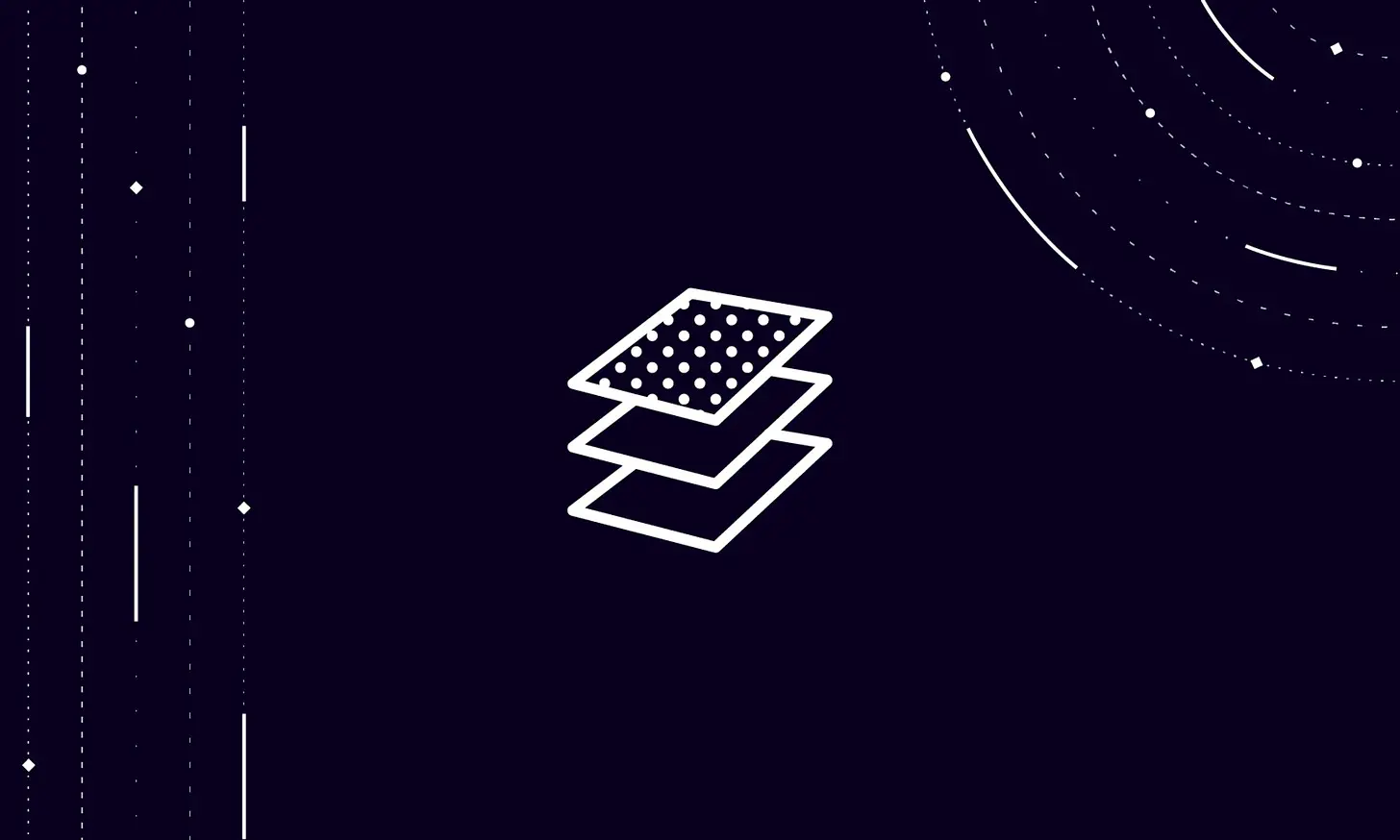
zkVM Compared to Other Virtual Machines
Traditional virtual machines (VM) typically refer to the virtualization of a complete computing environment on physical hardware, with the core function being the simulation of hardware environments, allowing multiple operating systems or applications to run on the same physical hardware. These virtual machines mainly achieve their functionality through hardware virtualization technology and operating system-level isolation. They usually do not involve the encryption verification process of applications or data running within them.
Zero-knowledge virtual machine (zkVM) uses zero-knowledge proof technology to ensure the correctness of program execution processes, which is applicable to any program that can be compiled and run on a virtual machine. zkVM's design focuses on providing a universal computing verification platform applicable to various scenarios and supporting multiple programming languages such as Rust, C/C++, and Go, allowing developers to build applications using their preferred languages. The computation and verification processes are often more time-consuming than traditional VMs because generating zero-knowledge proofs is a computationally intensive process that requires significant computing resources, which greatly limits transaction processing speed (TPS). Although significant progress has been made in individual proof generation with current zk technology, the ability to process large-scale transactions under high load conditions remains limited. Each proof generation may take several seconds to minutes, posing limitations for applications requiring high throughput, such as large-scale payment processing systems.
zkEVM is a specific implementation of zkVM designed for the Ethereum ecosystem, aiming to enhance Ethereum's scalability through zero-knowledge proofs. It is fully compatible with Ethereum's smart contracts and development tools, such as Solidity and Vyper. Existing Ethereum applications can seamlessly migrate to zkEVM without any modifications. Therefore, zkEVM is more like a specifically optimized version for Ethereum.
zkVM Related Projects
Despite the challenges of zk technology, some projects in the market have demonstrated technical strength in developing zkVM solutions.
Jolt: Outstanding Performance
On April 9th, a16z released the preliminary implementation of the zkVM solution Jolt, which is a new type of zkVM known for its fast execution speed and easier scalability and code auditing for developers.
Different from other zkVMs based on the STARK framework, Jolt utilizes Lasso for parameter lookup and sumcheck-based technology. This innovative approach not only simplifies the implementation of new virtual machine instructions but also improves the overall system speed. Jolt's design emphasizes usability and efficiency, with each CPU instruction in Jolt requiring only 50 lines of Rust code. Additionally, Jolt's performance is outstanding, with the preliminary benchmark tests showing that the speed of executing zero-knowledge proofs is more than 5 times faster than RISC Zero and 2 times faster than SP1.
RISC Zero: Efficient Handling of Complex Computations
RISC Zero is a zkVM with a recursive SNARK structure, characterized by its use of a recursive method that supports nested proofs. In SNARKs technology, recursion can break down complex proofs into smaller, more manageable proofs. These small proofs can be independently verified and eventually merged into a complete large proof without affecting its validity. The uniqueness of RISC Zero lies in its implementation of the recursive method, seamlessly integrating multiple layers of proofs into a single proof chain, reducing computational load and the amount of data to be processed, while maintaining the security and integrity of the verification process across multiple computation steps.
Another unique aspect of RISC Zero is its use of the RISC-V instruction set, an open standard ISA (Instruction Set Architecture) designed to achieve scalability and extensibility. This choice ensures that RISC Zero can leverage a wide range of tools and support ecosystems, making it more accessible and integrable into existing systems compared to zkVMs that may use proprietary or less common architectures.
Last year, they successfully completed a $40 million Series A financing round. This round was led by Blockchain Capital, with other notable investors including Bain Capital Crypto, Galaxy Digital, IOSG Ventures, RockawayX, Maven 11, Fenbushi Capital, Delphi Digital, and others participating.
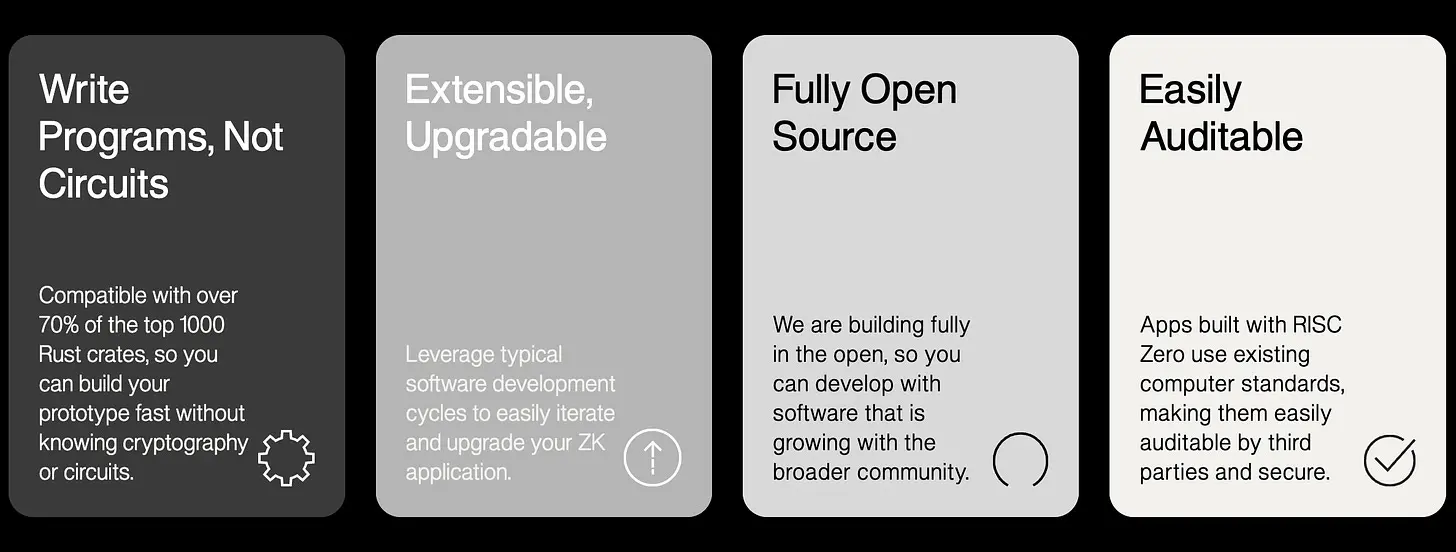
Succinct: Developer-Friendly
Succinct has developed zkVM SP1, which is tailored for executing code written in Rust or any other language compilable through LLVM, offering higher flexibility and ease of use. SP1 supports a modular architecture, allowing developers to customize and extend its functionality through "precompilation." Precompilation refers to specific modules that developers can add or modify, enhancing the core virtual machine's functionality to handle specific tasks or computations more efficiently.
Furthermore, SP1 has built a decentralized prover network, simplifying the deployment and execution of proofs, thus lowering the barrier to using advanced encryption methods. This network enables developers to efficiently generate proofs with a simplified approach.
In March, Succinct completed a $55 million financing round. The round was led by Paradigm, with participation from Robot Ventures, Bankless Ventures, Geometry, as well as angel investors Sreeram Kannan from Eigenlayer and Sandeep Nailwal, co-founder of Polygon. On May 13, Succinct announced the launch of the SP1 testnet.
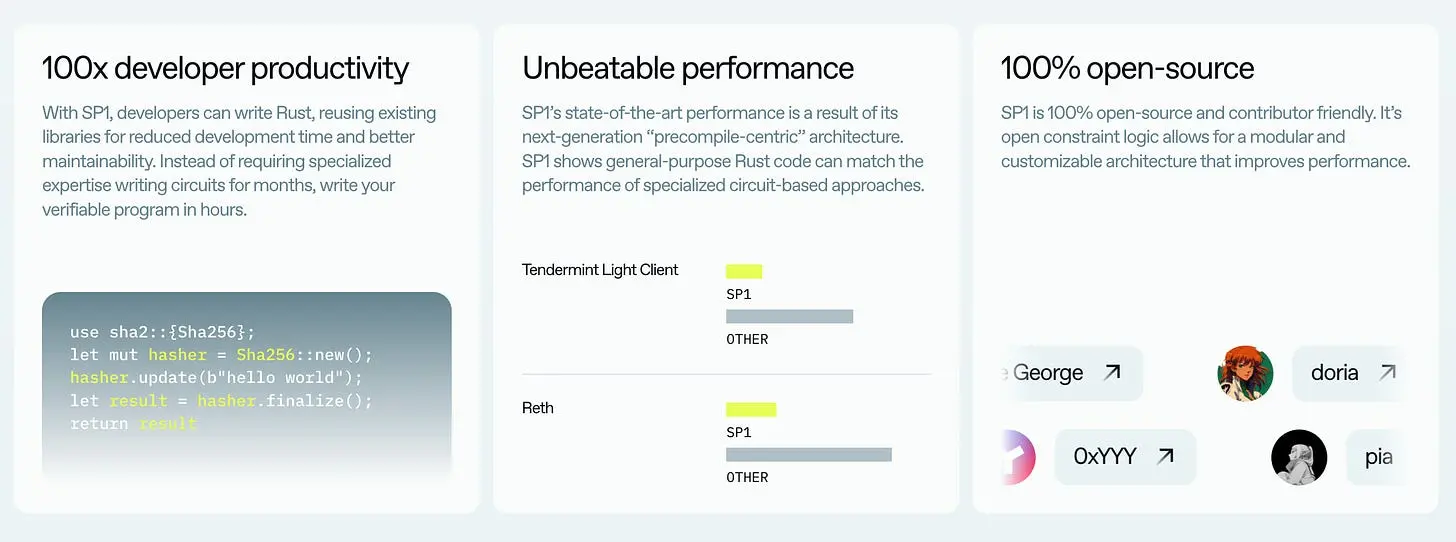
Taiko: Multi-Proof System
Taiko has started transitioning from using zkEVM to using zkVM, with its unique application of a multi-proof system. The concept of multi-proof was proposed by Vitalik, and Taiko claims to be the first project to implement this concept, which will be directly supported upon the mainnet launch at the end of May. This system allows Taiko's zkVM to generate multiple types of proofs, thereby enhancing the system's security and robustness. Even if one type of proof encounters issues, other types of proofs can continue to ensure the system's normal operation and promptly detect any erroneous state transitions. Additionally, the system adopts the Halo2-KZG proof system, enabling efficient and low-cost processing of complex computations and large-scale transactions.
In March, Taiko completed a $15 million Series A financing round, led by Lightspeed Faction, Hashed, Generative Ventures, and Token Bay Capital, with participation from Wintermute Ventures, Flow Traders, Amber Group, OKX Ventures, and GSR.
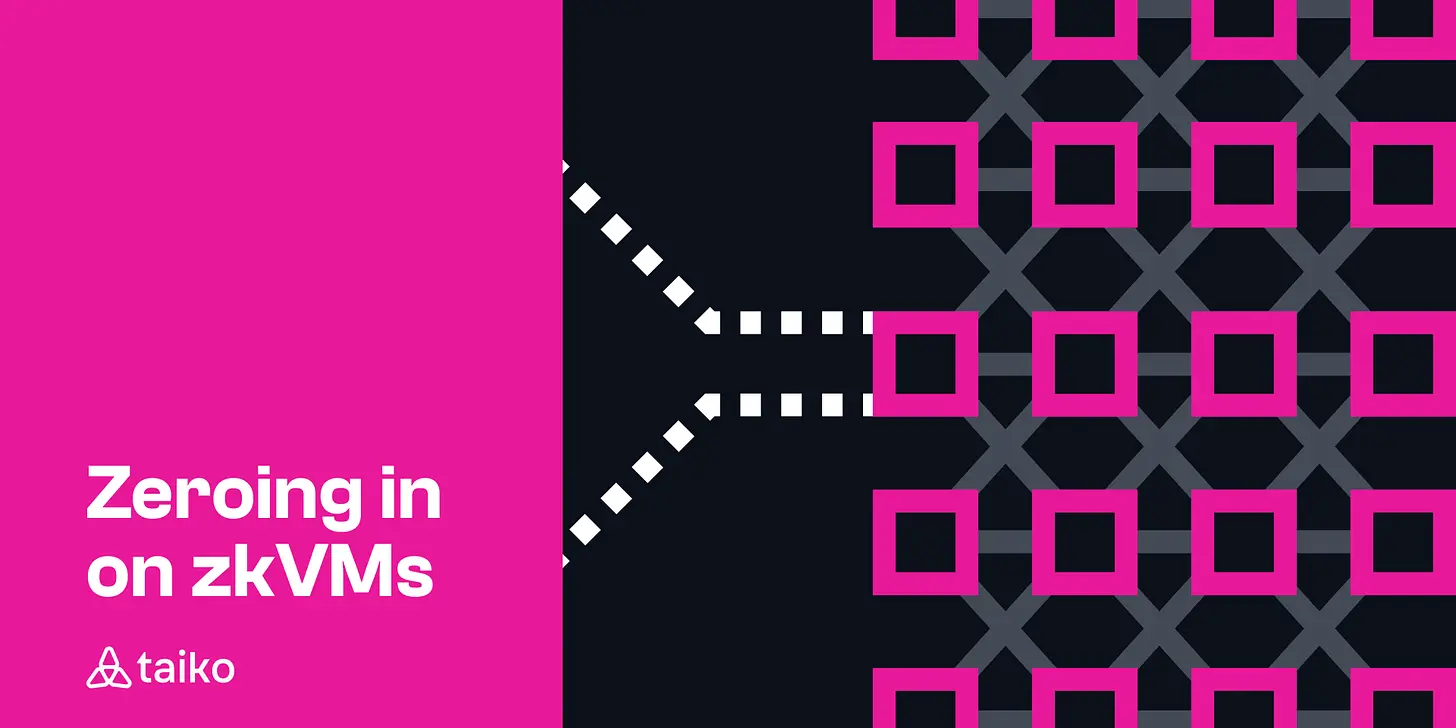
ZKM: Simple and Stable MIPS Architecture
ZKM is a zkVM project incubated by the Metis Foundation, using the MIPS architecture combined with zero-knowledge proof technology to create a zk virtual machine. This design aligns ZKP more closely with the internal computational processing of the system, accelerating operation speed and reducing the computational overhead associated with implementing ZKP protocols separately. Additionally, while most zkVMs use the Rust language, ZKM provides native support for Golang.
MIPS (Microprocessor without Interlocked Pipeline Stages) is a first-generation Reduced Instruction Set Computer (RISC) architecture. The MIPS instruction set is relatively simple and stable, widely applicable in various computing devices and embedded systems, with good versatility and adaptability. The ZKM system based on the MIPS architecture can be more easily developed and deployed.
zkMIPS divides the entire MIPS program into multiple segments, then categorizes each segment's instructions into four types and assigns them to corresponding modules. zkMIPS uses the STARK proof method to independently verify the instructions in each module, ensuring that each operation in the table is correct and that each instruction in the program segment is included in its respective module table. It then verifies the execution sequence of each program segment matches the execution of the entire program. This way, even programs executed off-chain can be verified on-chain, enhancing the transparency and trustworthiness of program execution.
Recently, ZKM launched a new trust-minimized multi-chain interoperability infrastructure called Entangled Rollups, using zkMIPS to build a trustless, decentralized multi-chain interoperability framework. Unlike third-party zk bridges that only verify asset transfers through snapshots, all computations can be verified, making it very secure. The key to this interoperability is the existence of a universal proof mechanism that can generate a proof on one blockchain and then verify it on another. One of the differences between ZKM and other zkVMs is its ability to generate a zero-knowledge proof applicable to all operations. ZKM embeds security into the underlying CPU/MIPS architecture, allowing all software built on this architecture to enjoy the same level of security without the need for individual software to undergo the zero-knowledge proof process.
Additionally, ZKM features:
- Compatibility with all virtual machines: ZKM sits below each virtual machine, making it compatible with various blockchain smart contract engine VMs, such as Move VM (zkMVM), WASM (zkWASM), and Rust VM (zkRVM).
- Plug-and-play: Developers can adopt ZKM without changing existing codebases, providing a low-cost adoption and allowing the use of different smart contract languages or even traditional programming languages.
- Long-term stability: The MIPS instruction set is stable and does not need to change with the evolving EVM, providing a more stable environment for development.
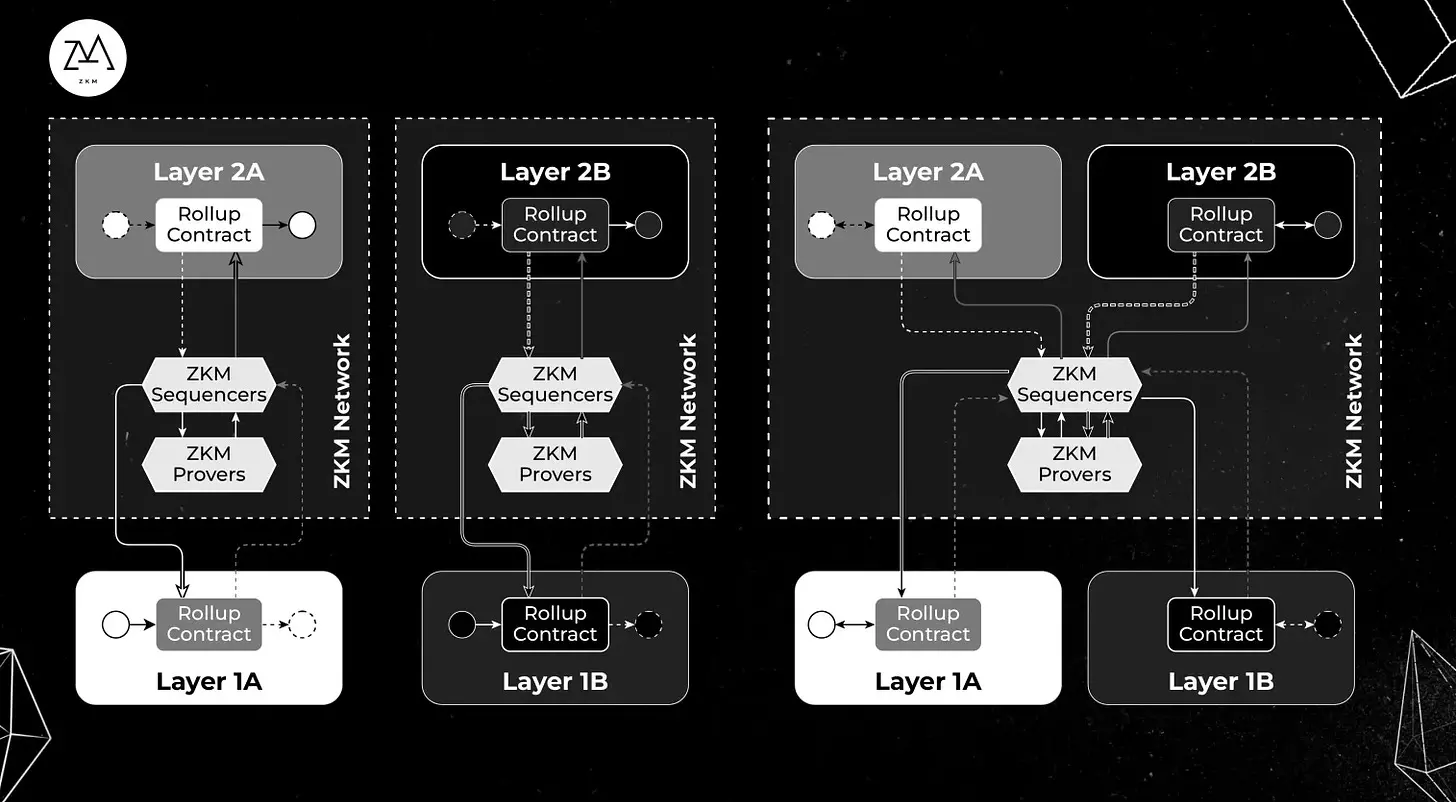
Future Prospects of zkVM
As blockchain technology continues to mature and leading companies explore further, the performance of zkVM is constantly improving. We can foresee that zkVM will play an increasingly important role in the encrypted world and become a part of key technologies. Especially in the current environment of increasing data sensitivity and demand for cross-chain security, zkVM's capabilities are well-suited to market demands. We look forward to overcoming various technical challenges, such as circuit optimization and optimization of the proof system itself, to launch a zkVM that perfectly adapts to various programming languages, leading more developers into the new era of Web3.
免责声明:本文章仅代表作者个人观点,不代表本平台的立场和观点。本文章仅供信息分享,不构成对任何人的任何投资建议。用户与作者之间的任何争议,与本平台无关。如网页中刊载的文章或图片涉及侵权,请提供相关的权利证明和身份证明发送邮件到support@aicoin.com,本平台相关工作人员将会进行核查。




